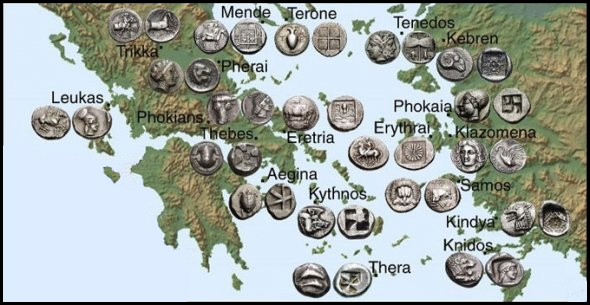
Welcome to Greek Coins
|
Products exchange has been a very common procedure since antiquity when ancient people used to exchange one thing with another, for example fish with vegetables or wood with marble etc. Given that this was an inconvenient exchange system as it was not possible to estimate the correspondent value of each exchangeable product on the basis of another one, a commonly accepted method should be invented in order to secure trading activities. For this reason, people decided to establish a common exchange means that would facilitate trading without risking any loss of each part that would take part in the exchanges. |
According to Aristotle (Politics), people agreed on proceeding to their exchange activities using something that would be commonly useful and valuable, so they created iron and silver made coins. Even though the main factor that affected the Economy of ancient cities was animals (main cows) possession, metal coins were considered to be ideal as they could be transferred easily and of course they could be divided into smaller pieces while not spoiling as time went by.

According to Herodotus, the Father of ancient greek History, the first coins were cut in Lydia town, Asia Minor. However, modern researchers cannot define when the first coins existed as there are no scripts related to the date of the first coins ever appeared. Following excavations that were carried out in the area of Diana's Temple, Ancient Ephesus, where a lot of ancient coins and silver taws where brought to light, the first coins appeared in the cities of Ionia and Lydia, Asia Minor, in the second half of the 7th century BC. In the middle of the 6th century, the first coins were firstly used in Aegina island and continuously to the rest of the greek mainland. The first coins were cut in Athens approximately in 615 BC.
The Greek Coinage History is divided into three chronological periods starting from the Archaic Era (600-480 BC), the Classical Era (480-330 BC) and the Hellenistic Period (330-1st century BC). The ancient greek coins were handmade contrary to the industrialized coins of modern world. Silver, gold, electrum and bronze were used for making the coins while several depictions were carved on them.
Nowadays, we can see a lot of rare and very expensive ancient greek coins in the National Numismatic Museum of Athens yet collectors may exchange some rare coins, both ancient and modern greek, via the Internet.
Greek Coins Memberships








